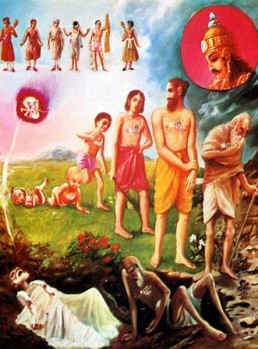Swami Chinmayananda
Swami Chinmayananda Commentary
It is the law of memory that the experiencer and the memoriser must both be the same entity; then alone can memory power function. I cannot remember any of YOUR experiences nor can YOU remember any of MY experiences; I can remember my experiences as readily and easily as you can remember your experiences.
In old age, everyone of us can remember the main incidents of his own childhood and youth. In the progress of growth, childhood dies away and youth appears, and youth dies before old age can assert itself. In the old man, it is self-evident that neither his childhood nor his youth is with him, and yet, he can remember his own early days. Applying the principle of memory, it becomes quite clear then that ‘SOMETHING’ in us is common in all the different stages of our growth so that the same entity remembers the experiences gained by it in the past through the childish body, and later, through the youthful structure.
Thus, youthfulness may be considered as a birth, when childhood has met with its death. So too, old age is born when youth is dead. And yet, none of us is the least disturbed by these changes; on the other hand, we feel, in fact, happier due to the wealth of experiences we have gained as the status of the body rose from innocent childhood to matured old age.
Using this subjective experience of every one in the world as a standard of comparison, Krishna is trying to bring home to Arjuna that wise men do not worry when they leave one body for the purpose of taking another one.
This stanza is again asserting, in unequivocal terms, the truth behind the Reincarnation Theory. And thus viewed, death can no more be a threat to a wise man. We do not moan at the death of childhood following which alone can we come to experience youth; we are confident in our knowledge that though youth is entered into and childhood has ended, there is a continuity of existence of the same one only, so, a child has now become a youth. So too, at the moment of death, there is no extinction of the individuality, but the embodied-ego of the dead-body leaves its previous structure, and according to the vasanas (mental impressions) that it had gathered during its embodiment, it gets identified with a physical equipment, where it can express itself completely, and seek its perfect fulfilment.
Adi Sankara Commentary
As to that, to show how the Self is eternal, the Lord cites an illustration by saying,’…of the embodied,’ etc. Yatha, as are, the manner in which; kaumaram, boyhood; yauvanam, youth, middle age; and jara, decrepitude, advance of age; dehinah, to an embodied being, to one who possesses a body (deha), to the Self possessing a body; asmin, in this, present; dehe, body –. These three states are mutually distinct. On these, when the first state gets destroyed the Self does not get destroyed; when the second state comes into being It is not born. What then? It is seen that the Self, which verily remains unchanged, acquires the second and third states. Tatha, similar, indeed; is Its, the unchanging Self’s dehantarapraptih, acquisition of another body, a body different from the present one. This is the meaning. Tatra, this being so; dhirah, an intelligent person; na, does not; muhyati, get deluded.
The Bhagavad Gita with the commentary of Sri Sankaracharya – Translated by Alladi Mahadeva Sastry
Holy Geeta – Commentary by Swami Chinmayananda
The Bhagavad Gita by Eknath Easwaran – Best selling translation of the Bhagavad Gita
The Bhagavad Gita – Translation and Commentary by Swami Sivananda
Bhagavad Gita – Translation and Commentary by Bhaktivedanta Swami Prabupadha
Srimad Bhagavad Gita Chapter 2 – Verse 13 – 2.13 dehino ‘smin yatha – All Bhagavad Gita (Geeta) Verses in Sanskrit, English, Transliteration, Word Meaning, Translation, Audio, Shankara Bhashya, Adi Sankaracharya Commentary and Links to Videos by Swami Chinmayananda and others – 2-13

